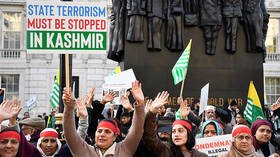Reality of fakes: Western media’s news factory on India is well-oiled and kicking

From the New York Times to the BBC and the Wall Street Journal, the biggest news media have been caught peddling lies and being condescending and hostile towards India, a vibrant democracy and one of the oldest civilisations.
It has been 72 years since India achieved freedom from her British colonisers, but the West’s media has still not come to terms with it.
Its correspondents still arrive like new viceroys, and much of the reportage ranges from patronising and condescending to viscerally hostile and downright fake. Media outlets from nations merely a few hundred years old, for instance, lecture civilisations like India – one of the oldest in the world – on civilisational matters such as Kashmir. They also give sermons to unique civilisations like China or Russia on matters they understand little about.
And the vanguards of western media continue to speak sanctimoniously about their editorial standards, despite being repeatedly caught spreading fake news.
Also on rt.com Great game in Washington? India dancing with the US bison, hugging the Russian bearCitizenship law and ‘Eew’ York Times
The moment the Narendra Modi government passed the Citizenship Amendment Act to shelter persecuted minorities from neighbouring Islamic nations Pakistan, Afghanistan and Bangladesh, the western fake narrative-setting machinery creaked into action. One of the first off the block was the virulently anti-India – and globally anti-nationalist – New York Times.
One of its very first reports carried a lie in the headline. ‘India takes step towards blocking naturalization for Muslims’, it screamed.
New York Times crosses limits of fake news, says 'India blocks naturalization for Muslims.'In a sinister spin to recent events, #NewYorkTimes has carried an insidious, fake news about the #CitizenshipAmendmentBillhttps://t.co/Nuok3r6LeI
— tfipost.com (@tfipost) December 10, 2019
But the act only gives a right to persecuted minorities. It does not take away the rights of any individual or group. Muslims can still obtain Indian citizenship by way of naturalisation, provided they fulfill necessary conditions.
This is NYT coverage of CAB Bill. What a joke these people are. Knowing fully well that CAB has nothing to do with Indian Muslims yet they will spin this yarn. This is ranting not reporting pic.twitter.com/lWArQDyBTp
— Sunanda Vashisht (@sunandavashisht) December 9, 2019
Another NYT report spoke about the marginalisation of Muslims, which is ‘Prime Minister Narendra Modi’s Hindu-nationalist agenda’. Again, this is either an uninformed rant or a blatant falsehood. India’s new citizenship law has nothing to do with Indian Muslims. And the ‘Hindu nationalist’ government has included persecuted Christians, Buddhists, Jains, Sikhs and Zoroastrians from the three Muslim-majority nations as beneficiaries along with Hindus.
How media vulture fed on Kashmir
Kashmir, one of the world’s most militarily sensitive zones, has always been the playground of propaganda for the western press. India’s strong, civilisational bond with Kashmir has been stubbornly ignored, and jihadi separatist voices given legitimacy.
The scrapping of the Jammu and Kashmir’s special status under Article 370 earlier this year triggered a fresh fake news salvo by the western media.
The Wall Street Journal reported: ‘India’s Kashmir clampdown turns hospitals into graveyards’ - a claim stoutly refuted by one of the most senior police officers in Kashmir, who also pointed to the total lack of proof in the article.
The venerable Washington Post and Huffington Post reported about children being detained in Kashmir jail. India’s Supreme Court, based on the findings of four high court judges, struck down a petition on this, saying no child is illegally languishing in Kashmir’s jails.
Congrats on the double whammy @washingtonpost !!! Get a fact & evidence free “journalist” like Rana to spew drivel on your website & then get humiliated by the Supreme Court of India for some more Unsubstantiated drivel. Your logo subheading should be “we don’t substantiate” https://t.co/uvqVJSoQEx
— Abhijit Iyer-Mitra (@Iyervval) December 13, 2019
Fake reporting reached a point where Kashmiris in the US came out to stage a peaceful protest in front of the Washington Post office.
Indians protesting outside the office of @washingtonpost against the newspaper’s biased news coverage in Kashmir. Their slogan is...#WhyChooseJihadiNewsAll is well in Kashmir. What is wrong is in the Pakistani mind. And...we can’t do anything about addled brains. pic.twitter.com/GgpUssJkhC
— Major Gaurav Arya (Retd) (@majorgauravarya) September 7, 2019
Old Beeb didn’t disappoint either. The BBC kept away all its nonsense detectors and published photos and news which made one laugh out loud even in dark times. The image of neatly eye-patched women, supposed victims of excesses by Indian forces, was blatantly unconvincing.
So they all got shot in the left eye? Now that's one hell of an aim!I request the make up artists in #Kashmir to kindly do their work professionally, remember Pakistan media & #BBC is counting on you.#KashmirProtestspic.twitter.com/oNExt1ii4h
— Vivekk | विवेक | বিবেক | விவேக் | (@oyevivekk) August 23, 2019
The Indian government even confronted the BBC and Al Jazeera over fabricated videos showing unrest in Kashmir and asked for the raw footage, which was reportedly met with silence.
Beeb’s facts blow up in its face
The BBC had to quietly retract its research which termed some nationalist social media handles as ‘fake news purveyors’ after its report was challenged.
When BBC pulled down its 'research' calling nationalists as 'fake news purveyors', and republished it with a carefully hidden confession about their shoddy work. #BBCFakeNewshttps://t.co/iUnw29mzqA
— OpIndia.com (@OpIndia_com) August 12, 2019
It also reported that a Sikh police officer had received death threats for helping a Muslim man. Before long, the officer called out this lie and denied getting death threats. The BBC had to meekly issue a retraction.
“BBC retracts the fake news it published on Sikh police officer getting death threats for saving Muslim man”via @OpIndia_comhttps://t.co/gLFw5POmhn
— Amrita Bhinder (@amritabhinder) May 31, 2018
The BBC has also been accused of carrying a highly biased ‘fact check’ on religious hate crimes in India by a local, equally biased, agency. It backtracked again on this, although only on minor points, leaving the glaring issues selectively unaddressed.
India through West’s aberration lens
The western media’s undeclared war on India’s global image, achievements, self-respect and sovereignty is long and unrelenting.
The New York Times published an elitist, condescending cartoon with racist overtones in 2014 when India sent its space mission to Mars. Following global outrage, NYT apologized.
New York Times apologizes for ‘India’s #Mars Mission’ cartoon http://t.co/SalmSYax0p#NYTpic.twitter.com/KCjsRh9pHT
— Jessica Chasmar (@JessicaChasmar) October 6, 2014
But the most apt answer to that came in the form of another cartoon, this one in The Times of India two and a half years later.
Times of India's response to a NYT cartoon from 3 years ago, after India set a record for launching 104 satellites into space at once 💅🏽 pic.twitter.com/hYMzBkAfRF
— Zeel (@zlprk) February 17, 2017
The most lethal counters to uncivilised behaviour are often delivered in the most civilised manner – something the western media could learn from old, wise civilisations.
Also on rt.com ‘Avoid lies’: Indian Army cautions against fake news on social media amid protests over citizenship billThink your friends would be interested? Share this story!
The statements, views and opinions expressed in this column are solely those of the author and do not necessarily represent those of RT.














